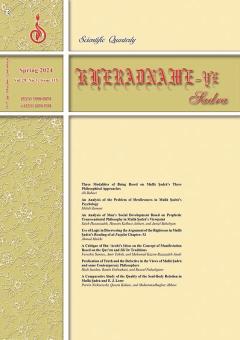-
-
List of Articles
-
Open Access Article
1 - سرمقاله
S. Mohammad Khamenei -
Open Access Article
2 - Three Modalities of Being Based on Mullā Ṣadrā’s Three Philosophical Approaches
Ali Babaei -
Open Access Article
3 - Analyzing the problem of negligence in the rational psychology of the transcendent wisdom of Mulla Sadra
Mehdi Zamani -
Open Access Article
4 - An Analysis of Man’s Social Development Based on Prophetic Transcendental Philosophy in Mullā Ṣadrā’s Viewpoint
Saleh Hasanzadeh Hossein Kalbasi Ashtari Jamal Babaliyan -
Open Access Article
5 - Use of Logic in Discovering the Argument of the Righteous in Mullā Ṣadrā’s Reading of al-Fuṣṣilat Chapter: 53
Ahmad Maleki -
Open Access Article
6 - A Critique of Ibn ‘Arabī’s Ideas on the Concept of Manifestation Based on the Qur’ān and Shi’ite Traditions
Fereshteh Samiee Amir Tohidi Mohammad Kazem Rezazadeh Joudi -
Open Access Article
7 - Predication of Truth and the Defective in the Views of Mullā Ṣadrā and some Contemporary Philosophers
Hadi Izanloo Ramin Golmakani Rasool Padashpoor -
Open Access Article
8 - Comparative Study of the Quality of the Soul-Body Relation in Mullā Ṣadrā and E. J. Lowe
Parvin Nickseresht Ghasem Kakaie Mohammadbagher Abbasi
-
The rights to this website are owned by the Raimag Press Management System.
Copyright © 2017-2026







